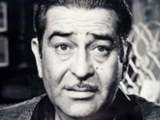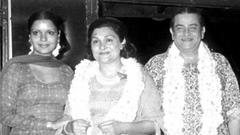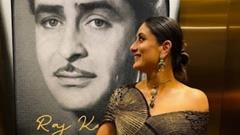A Bollywood music director who passed away unsung
Panaji, Nov 28 (IANS) He crafted hit songs for Bollywood over the decades and yet was forgotten in his time of need. IFFI-2007 has now paid a belated tribute to Dattaram Wadkar, who hailed from Goa and was music director for over 19 films.
Published: Wednesday,Nov 28, 2007 08:01 AM GMT-07:00
Panaji, Nov 28 (IANS) He crafted hit songs for Bollywood over the decades and yet was forgotten in his time of need. IFFI-2007 has now paid a belated tribute to Dattaram Wadkar, who hailed from Goa and was music director for over 19 films.
Titled 'Masti Bhara Hai Sama', the 80-minute film focuses on the life and work of the man who passed away in June 2007 at the age of 78. Popularly known as Dattaram, he stayed in Maulinguem in Goa's dusty mining heartland of Bicholim.
In the film, Wadkar's interviews are spliced between memorable yesteryear film songs. With English subtitles, the nunaces of the lyrics were felt by pan-Indian and even global audiences at the International Film Festival of India (IFFI) currently under way here.
'My long-time dream has been to make films on filmmakers and technicians, to create archival work,' director Ashok Rane said at the screening.
The film begins with an old-fashioned radio playing out film music that so enchanted a generation and more of Indians in times when entertainment options were highly restricted.
Dattaram is credited with hit Bollywood film songs like 'Aansoo bhari hain yeh jeevan ki raahein' (from the film 'Parvarish'), 'Chun chun karti aayee chidiya' (from 'Ab Dilli Door Nahi') or 'Masti bhara hai sama' (also from 'Parvarish').
Interviewed for the film shot before his death, the man behind these and scores of other hit songs of the past told his story with animated interest.
He began his career with the legendary film music director duo Shankar-Jaikishan on the tabla and the dholak and later became their assistant. He later turned independent music director, and this documentary tells the story of an ordinary boy who came from Goa and captured the Indian imagination with his music.
Dattaram also did music in the languages of Bhojpuri, Magadhi and one Marathi film ('Preamchi Savali' which starred former Test cricketer Sunil Gavaskar.)
'Ask a pro from the Hindi film music fraternity in Mumbai and anyone will tell you about 'Dattu Ka Theka' (Dattu's beat),' said a fan of his.
Somewhere in the early 1940s, the young Dattaram made his way to Mumbai and was working in the docks as a labourer. Obviously, he was poor and not exactly educated. He had learned the tabla for a few years mainly encouraged by his mother who was a local singer.
He used to be a gym enthusiast when he met Shankar, became his disciple for the tabla and also joined the Prithvi Theatre as a helping hand with music. He worked on many films as a 'theka' player for rehearsals and finally did his first recording for the film 'Nagina'.
Dattaram became an important member of the RK Group - as it was then called - and worked closely with the likes of Raj Kapoor, Shankar-Jaikishan, Shailendra and Hasrat Jaipuri.
Through the 1950s and 1960s, Dattaram found himself close to Jaikishan, who expired in 1971. After the decline of the Shankar-Jaikishan team, Dattaram found himself at sea.
He did work with other music directors like Laxmikant-Pyarelal and was Raj Kapoor's trusted man when he worked on the music for 'Bobby' with the duo. Later, he chose to retire and return to Goa.
Towards his end, he underwent two massive heart attacks, and needed a gall bladder operation, for which he lacked funds.
Dattaram's plight was discovered quite by accident. Pune-based media professional Sandeep Apte was researching for a film script on the life and career of Shankar-Jaikishan. Newspapers, magazines and books led him to Dattaram.
It is well known that artistes from Goa, 600 km south of Mumbai, have made immense contributions to Hindi film music. But today, most Goans themselves seem unaware of it.
'If you write the history of film music in India, Dattaram's name cannot be forgotten. In fact, his name would come right on the top,' a prominent music director of today says in the film.
Your reaction
 Nice
Nice Awesome
Awesome Loved
Loved LOL
LOL OMG
OMG Cry
Cry Fail
Fail













Comments (0)